

Let’s be real. Teaching today is not for the faint-hearted.
As teachers, you carry more than just a curriculum — you carry communities, trauma, gaps in learning, limited resources, socio-economic disparities, disciplinary challenges and the weight of rising expectations.
Needless to say, the journey of education in our province is not without its hurdles. Budget constraints have led to difficult decisions, including the reduction of over 2,400 teaching posts effective from January 2025. Yet, even in the face of such adversity, our teachers continue to rise, adapting and innovating to ensure that learning never stops. You show up. Day after day. With heart. With hope.
I’ve watched teachers reinvent themselves in the face of load shedding, device shortages, broken school gates, crime and shifting targets. That’s not just resilience. That’s leadership.
You lead when you say, “Let’s try again tomorrow.”
You lead when you integrate a new app that helps just one child grasp a topic or catch up.
You lead when you speak up in your staff meeting about learner wellbeing, cyberbullying, or why we need an ICT Committee that actually functions.
This is transformation in action — and it deserves to be seen..
That’s why I’m encouraging you to nominate a colleague for the National Teaching Awards. Too often, we assume leadership looks like titles, tech savvy, or loud personalities. But real leadership in education is purposeful. It’s consistent. It’s that one teacher who mentors others, who builds learners’ confidence, who uses WhatsApp voice notes as micro-lessons when data runs out. It's that teacher that integrates digital tools from the Teacher Sidekick to make lessons more engaging and purposeful. It's felt in the mentor who guides new teachers, sharing resources from the WCED ePortal to enhance their teaching strategies.
Let’s put the spotlight on those stories — acknowledge these champions. Nominate a colleague who embodies the spirit of transformation, who goes above and beyond to make a difference. In doing so, we not only honour their contributions but also reinforce the collective strength of our educational community.
Because here’s the truth:
We don’t just teach. We transform.
And every transformation starts with a teacher brave enough to believe that change is possible — even here, even now.
Nominate someone. Or nominate yourself. Because your work matters.
Link to video: https://www.youtube.com/watch?v=6at_V2YsFdM

For those who missed it, we launched a new initiative in the beginning of Term 3 aimed at enhancing our students' critical thinking skills. Check out Part 1 - 3 in the blogosphere. The remarkable efforts of our teachers and the positive outcomes for our students have been truly inspiring. I'm excited to share some insights from this journey.
This week's inspiration comes from the Business Studies classroom. In an attempt to still engage critical thinking but also increase engagement in class, this teacher modified the "Teach Like a Champion" Turn and Talk technique.
Let's call this technique: Turn and Talk with a Twist.
Here’s how it works:
Pose the Question: The teacher begins by posing a thought-provoking question to the class.
Group Discussion: Students are given time to discuss the question in small groups while the teacher circulates to listen in.
Share and Reflect: The teacher then asks one group member to share what another member said during their discussion.
Build on Ideas: The quoted group member is then asked to build on their initial explanation.
This technique not only encourages critical thinking and classroom engagement but also teaches active listening skills in young adults.
By incorporating this method, our students are not just engaging with the material on a deeper level; they are also learning to value and understand different perspectives. This fosters a collaborative learning environment where every voice matters and where students are motivated to think more critically and listen more intently.
Together, we are creating a community of learners who are not only academically proficient but also equipped with essential life skills.
Let's continue to innovate and inspire, nurturing minds that are curious, reflective, and eager to grow.
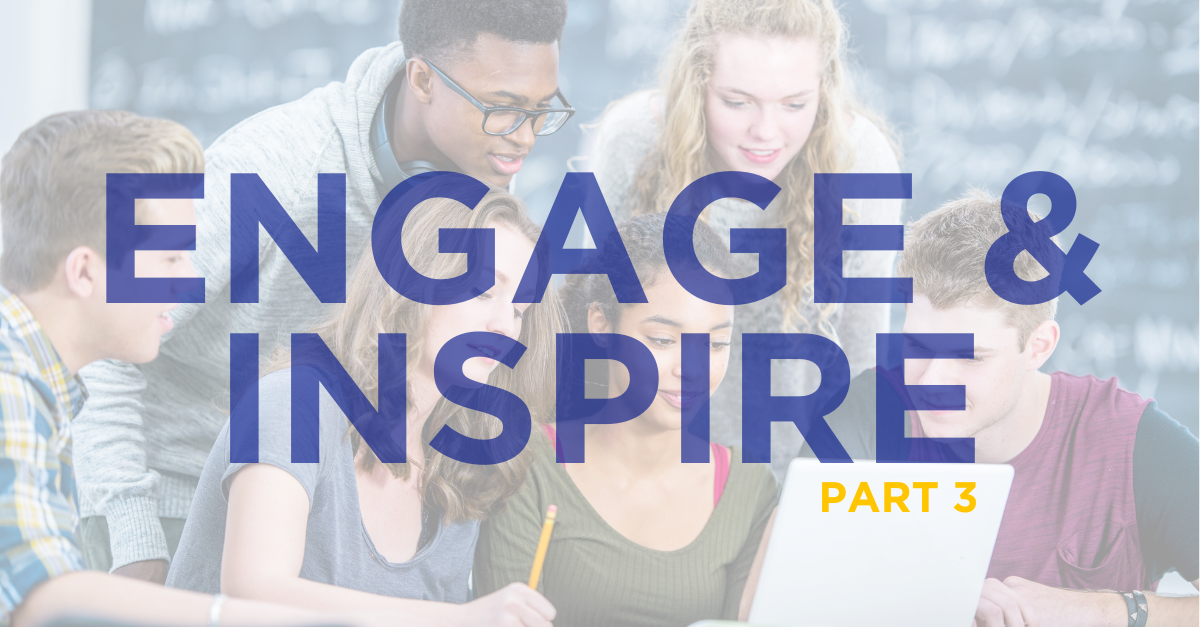
For those who missed it, we launched a new initiative last week aimed at enhancing our students' critical thinking skills. Check out Part 1 and 2 in the blogosphere. The remarkable efforts of our teachers and the positive outcomes for our students have been truly inspiring. I'm excited to share some insights from this journey.
This week, our inspiration comes from our blended learning class. Yes we have a class which accommodates 100 students. The primary instruction is delivered online (developed by our team), while the teacher's role in the classroom is to collect data and respond accordingly to close academic gaps.
Last week's identified gap: Students struggled to answer questions that required insight beyond the text, specifically in visual literacy. They tended to focus solely on what was explicitly visible or written in the text.
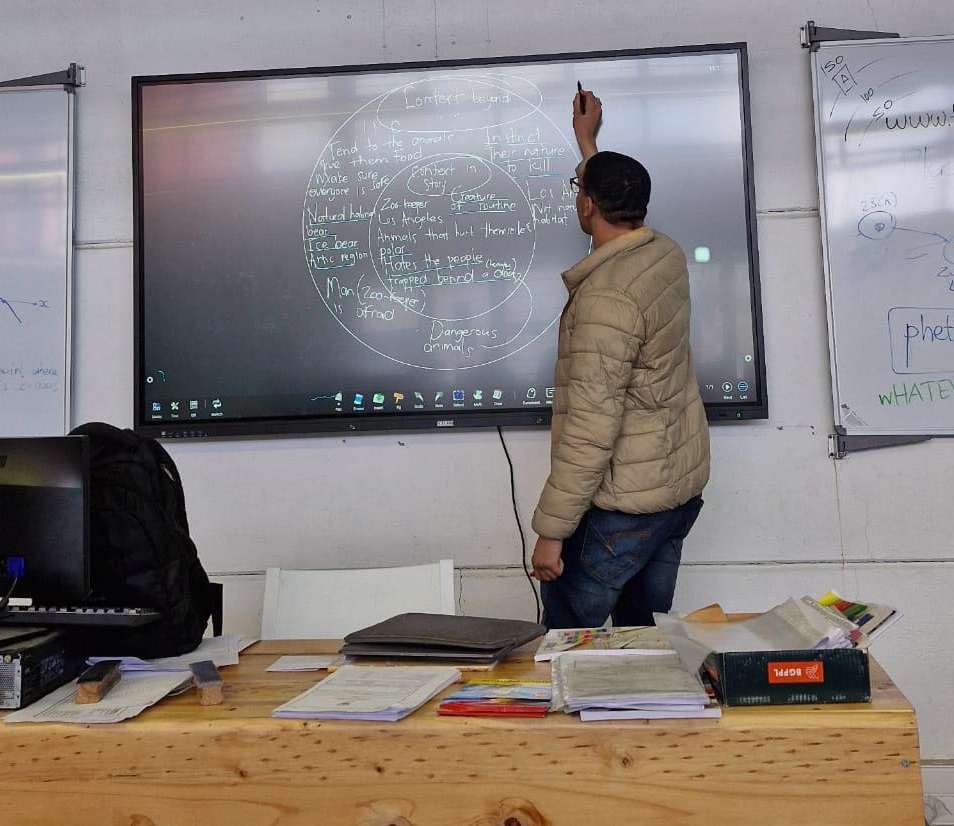
Let’s call this technique: Finding context Beyond the Text
Our goal is to teach students to recognize and understand references beyond the literal content of a text. As illustrated in the accompanying picture, the teacher draws two circles before starting any questions. In the inner circle, students list everything they can see in the text. Then, they draw an outer circle where they list everything they know about the items in the inner circle—this is the context beyond the text.
By doing this, students extend their thinking beyond what is literally visible and make connections to their broader knowledge and experiences. After completing the two circles, they then answer the questions, considering both the text and their prior knowledge or insights on the topic.
As a result of implementing this technique, we observed a significant improvement in students' proficiency in answering questions based on texts. This approach not only fosters deeper understanding but also equips students with skills to interpret and analyse information more effectively.
Next Up, Part 4!
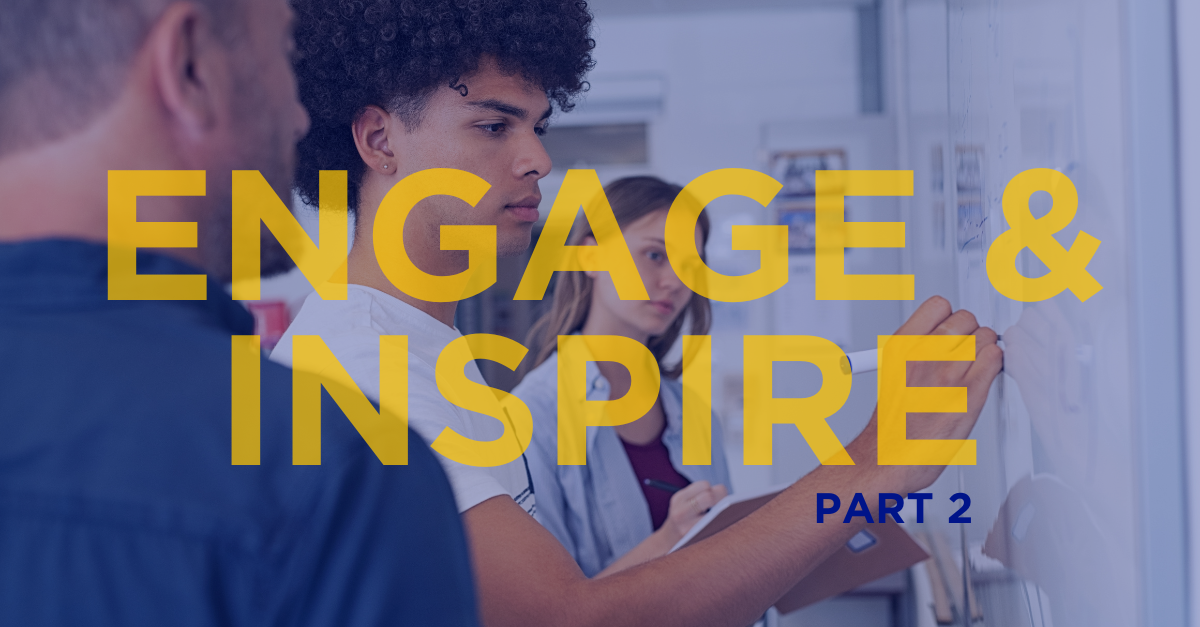
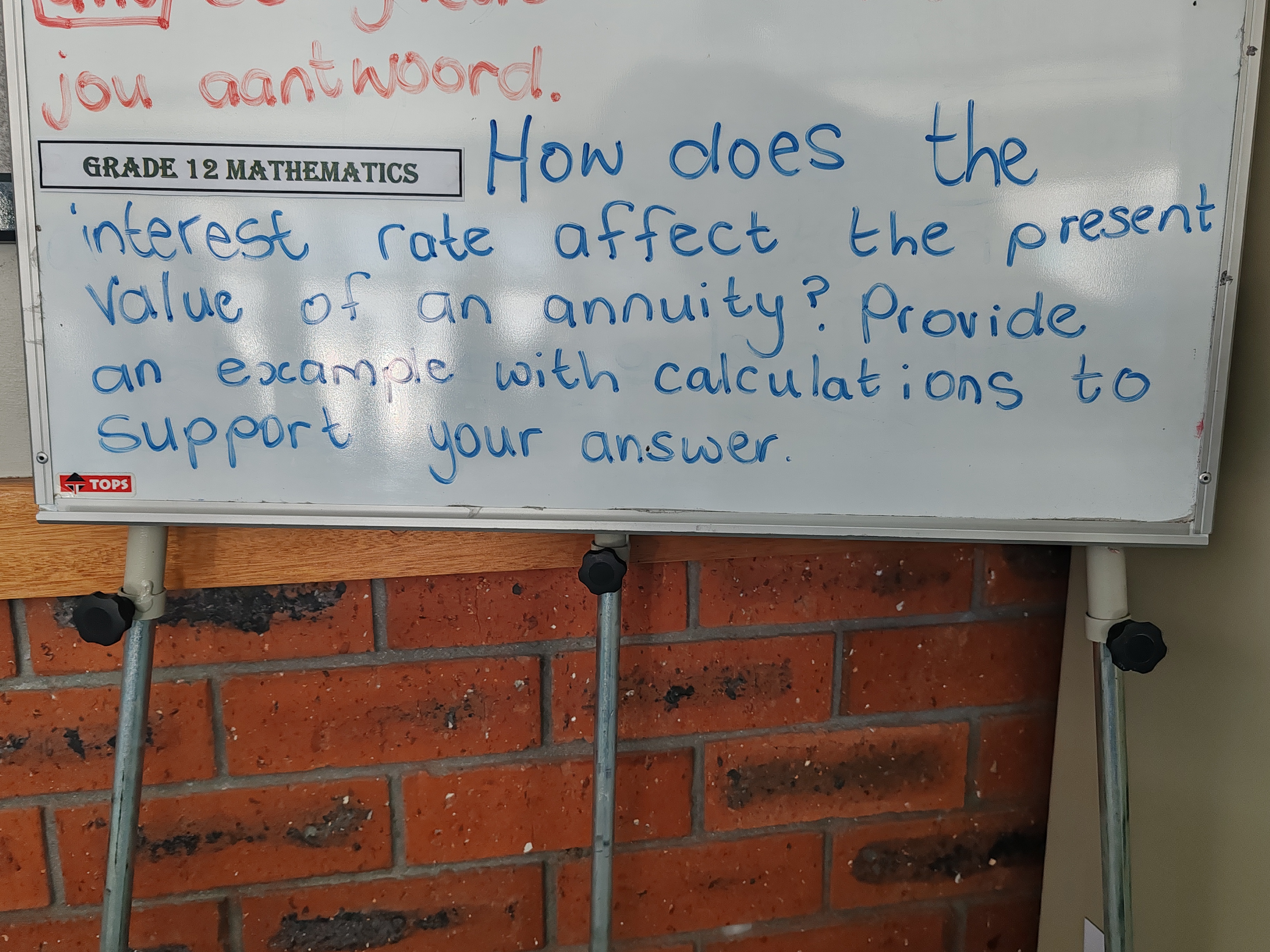
For those of you who missed it, we embarked on a new initiative this term called QUEST, aiming to push the thinking back to our students. The incredible work of our teachers and the positive impact on our students have been so inspiring that I couldn't wait to share some insights from this journey.
This week, I had the pleasure of observing some fantastic classroom strategies. It was tough to pick just one highlight, but here it goes.
Let’s call this technique: Endgame Inquiry
Here's what happened: The lesson objective was to help students calculate present value, monthly repayments, and the number of repayments for a present value annuity. She crafted a challenging question, perfectly tailored to their Zone of Proximal Development (ZPD). For those unfamiliar, ZPD is a key concept from Lev Vygotsky’s theory of learning and development, representing the sweet spot between what a learner can do independently and what they can achieve with guidance.
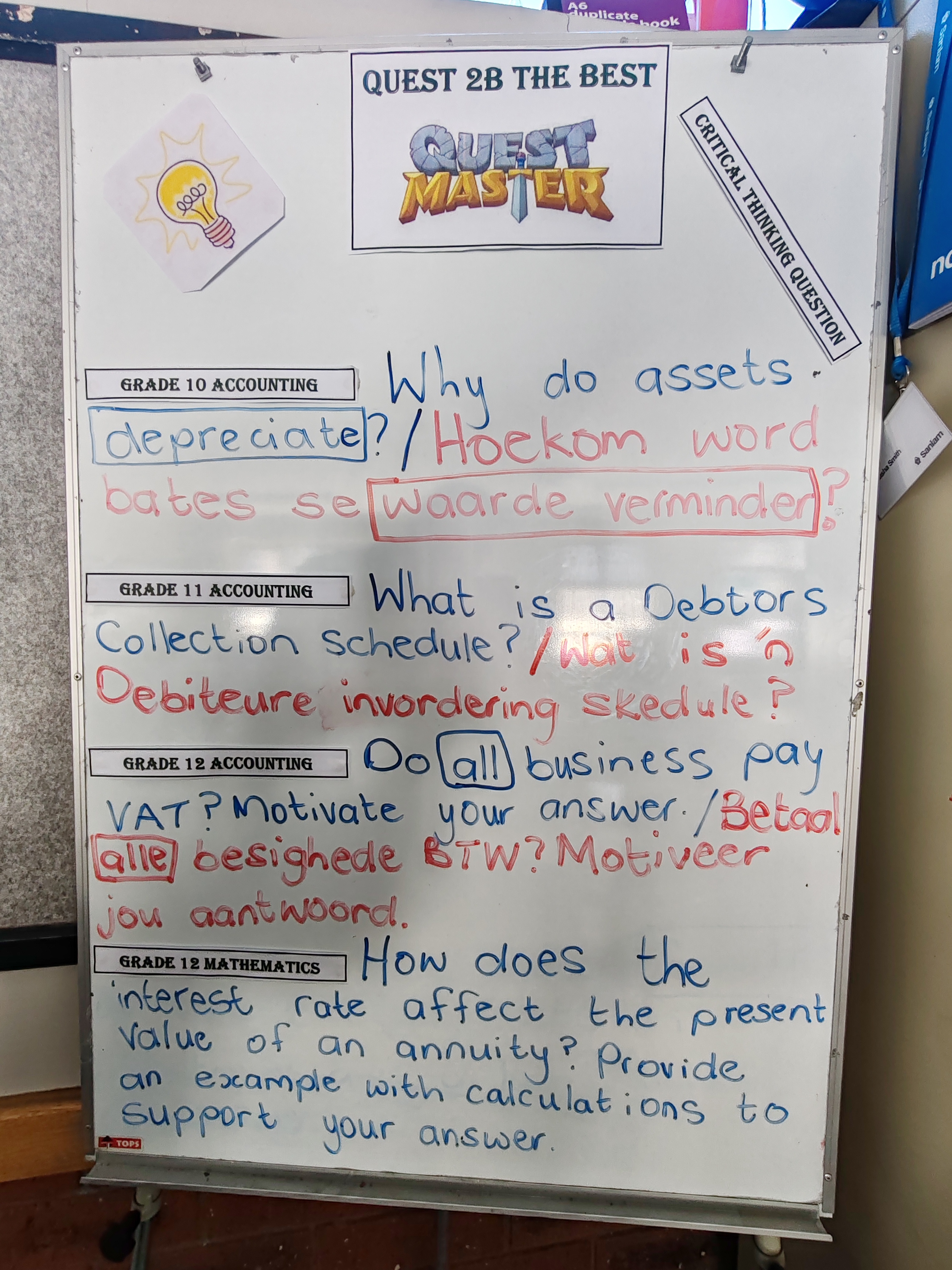
The teacher wrote this question on the board and dubbed it her "Quest to the Best" board. She then taught the lesson, and at the end, gave students time to discuss among themselves before tackling the critical question. It was fascinating to see how the strategic desk arrangement also boosted engagement.
I found this approach incredibly effective because posing the question at the beginning of the lesson really sparked deep thinking about the impact of interest rates. The students were engaged and actively participating, making the learning process both dynamic and insightful. Did I mention, they were excited to answer!
Next Up Part 3!
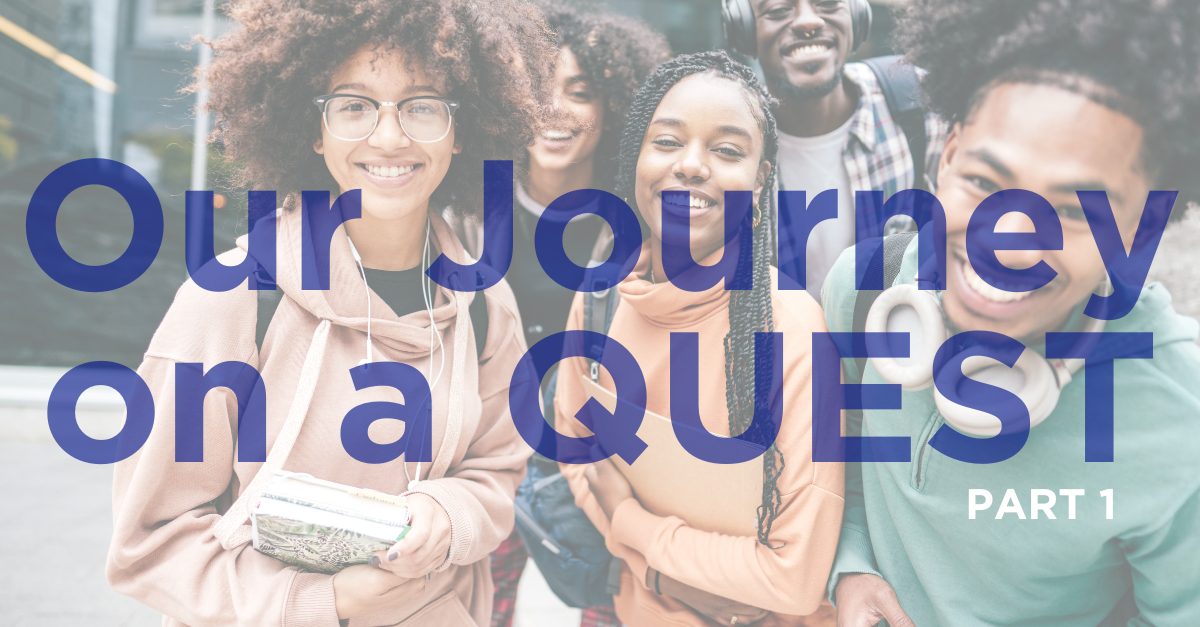
I once read that teachers quit because they lose hope. This made me wonder: Why do they lose hope? My theory is that their input does not match their output. The effort, work, and time they invest are not reflected in the results achieved by the kids.
I work at a brilliant school with brilliant staff. It is also a no-fee school, and we are faced with all the social ills that you can think of. Our kids are also great.
So, why are they not performing to our standard?
After 6 years at the school, we have instilled discipline and have exceptionally high expectations, but still only achieving a 94.5% pass.
I think I know the problem: the teachers are doing all the heavy lifting, and the kids are not engaged in critical thinking. They are passive in the learning process. Research by experts like Dan Willingham suggests that for students to learn, they must be actively engaged in effortful thinking about the material. In other words, learning is a consequence of thinking. Therefore, if we are not thinking, we are not learning.
So, at the end of Term 2, we decided to go on a QUEST:
Q: Query: Pose a thought-provoking question
U: Unravel: Solve complex problems
E: Engage: The kids will actively participate
S: Share: Discuss with others
T: Think: Reflect critically
Two weeks ago, Term 3 started, and it has been fantastic to see the creativity of the teachers. I have decided to share some of the teachers' wonderful techniques.
The first one is a practical change: many of the teachers came back and re-arranged their seating. Instead of placing the desks in a lecture-style format, facing the front, they made groups, facing each other and the board so that kids can more often engage in conversations. It's been amazing to experience the impact of this. The dynamics change from teacher-centered to learner-centered.
Tune in for Part 2 of the QUEST. Here's to the start of a magical learning Journey.
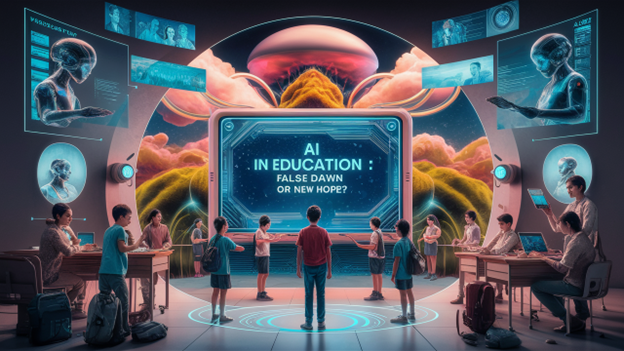
Artificial Intelligence (AI) has firmly entrenched itself in the fabric of our daily lives, transforming industries and reshaping how we interact with technology. In the realm of education, AI's presence is both a topic of excitement and apprehension. The question lingers: is AI in education a false dawn, promising more than it can deliver, or a beacon of new hope, heralding a revolution in learning?
Anyone who has used Generative Artificial Intelligence (GenAI) to any extent is likely to identify the opening paragraph as written by a GenAI tool, ChatGPT in this instance. From my tinkering with GenAI, this is my position on it: it’s not bad, but it lacks creativity, imagination and most importantly, contextual awareness (very much like the opening paragraph). In short, it works, but it’s not great.
I could certainly have spent more time refining the article with generative AI. The only thing I gave the AI systems was a title, generated by good old-fashioned human intelligence. Continued prompting and providing context should have allowed me to engineer the article so that it becomes contextualised. This would make it better, but I am not entirely convinced whether it would ever hit home the way I want this article to hit home…

That said, GenAI has unlocked a whole new world of potential. That potential is unlocked the minute you realise that it is a tool that helps you get there instead of a tool that does the job for you. Think of a screwdriver vs an electric screwdriver. Both get the job done, but the electric one makes it easier and faster. But, like any good handyman will tell you, you never only carry an electric screwdriver. There are times when a bit of elbow grease is the order of the day. Remove the human, however, and no screw is screwed.
Early in 2023 (after ChatGPT’s release in November 2022), it felt like a new AI tool was being released almost daily. My initial optimism for the incredible impact these tools could have on education was quickly dampened by the realisation that a lot of its power is hidden behind a paywall. A paywall is a term coined to describe the requirement of paid-for accounts to access more advanced features in digital tools. These AI tools offered a few uses before requiring you to pay for it, a payment based on United States spending potential.
This simply doesn’t work in the South African context. Our focus is still, understandably, on infrastructure needs and we are still some ways away from realising the value of these paid-for accounts. Realistically we also can’t afford licenses priced for first-world countries. Thus in early 2023, I was quite despondent in the realisation that many of these great AI tools would be available to only a select few, further exacerbating the issue of the digital divide and driving inequality.
Suddenly, things shifted. In the EdTech space, we are incredibly lucky that not all of it is driven by corporate greed. There still seems to be an element of care and consideration for learners, an almost philanthropic spirit lingering around. Towards the end of 2023, a lot of these paywalls suddenly seemed to be coming down. Even the paywalls that are still in place, were significantly lowered, offering real opportunities for developing countries to access advanced features.
Quizizz, for example, initially had its Quizizz AI tool behind a paywall. It was incredibly frustrating watching videos explaining amazing new tools and knowing that we wouldn’t realistically be able to use them in the majority of our schools. Now, while they still have premium features available for paid-for accounts, a lot of the AI-enhanced features are available for free. For example, the Quizizz Chrome add-on embeds a button on your browser which can create AI-generated quizzes for a website, document, presentation and even YouTube videos. And it’s entirely free.
There are many other examples where the AI tools for education that were initially only accessible to the well-to-do are now being made available for free. This makes me very hopeful that we could see a real impact. Generative AI could drive the democratisation of knowledge and information which was part of the early promise of the GenAI hype machine at the start of 2023.
What gives me even more hope is how accessible Generative AI is becoming. With Meta AI now available in WhatsApp, Facebook and Instagram, it has effectively become accessible on the go, in our pockets. This brings it much closer to the average user and no longer only the tech enthusiast. Add to that the relatively low data usage of text-based GenAI and low costs of mobile WhatsApp bundles and we could see the digital divide start narrowing.
ChatGPT opened Pandora’s box and we’re yet to see what fully emerges. While I am still optimistic about the potential impact of AI, we should tread carefully. The severe societal impact of social media showed us the dangers inherent to a far-reaching disruptive technology if left unchecked. AI has the potential to cause even more havoc if we do not consider the ethical and moral issues surrounding it.
We cannot afford not to face the question of AI in Education head-on. We should all be talking about it, tinkering with it and considering how it could impact our classrooms. We are only 16 months into this rollercoaster and I, for one, can’t wait to see where it takes us.
Learn more about Teacher Professional Developments such as AI and so much more: https://bit.ly/m/wcedtpd
Jaco Van Niekerk
Deputy Chief Education Specialist: Teacher Professional Development
Pages
Do you have an educational app, video, ebook, course or eResource?
Contribute to the Western Cape Education Department's ePortal to make a difference.


